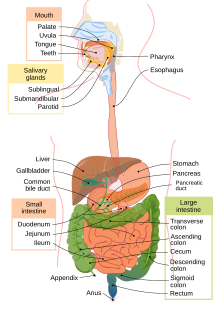
Back طب الجهاز الهضمي Arabic Gastroenteroloxía AST Qastroenterologiya Azerbaijani Гастраэнтэралогія Byelorussian Гастроентерология Bulgarian পাকান্ত্রবিজ্ঞান Bengali/Bangla Gastroenterologija BS Gastroenterologia Catalan پزیشکیی ھەرسکردن CKB Gastroenterologie Czech
 Illustration of the digestive system | |
| System | Gastrointestinal |
|---|---|
| Significant diseases | Gastrointestinal cancers, Gastrointestinal bleeding, Liver cirrhosis, Gallstones, Gastroenteritis, Inflammatory bowel disease |
| Significant tests | Colonoscopy, Stool test, Barium swallows, Endoscopy |
| Specialist | Gastroenterologist |
| Glossary | Glossary of medicine |
| Occupation | |
|---|---|
| Names |
|
Occupation type | Specialty |
Activity sectors | Medicine |
| Description | |
Education required |
|
Fields of employment | Hospitals, Clinics |
Gastroenterology (from the Greek gastḗr- "belly", -énteron "intestine", and -logía "study of") is the branch of medicine focused on the digestive system and its disorders.[1] The digestive system consists of the gastrointestinal tract, sometimes referred to as the GI tract, which includes the esophagus, stomach, small intestine and large intestine as well as the accessory organs of digestion which include the pancreas, gallbladder, and liver.[2][3]
The digestive system functions to move material through the GI tract via peristalsis, break down that material via digestion, absorb nutrients for use throughout the body, and remove waste from the body via defecation.[3] Physicians who specialize in the medical specialty of gastroenterology are called gastroenterologists or sometimes GI doctors.
Some of the most common conditions managed by gastroenterologists include gastroesophageal reflux disease, gastrointestinal bleeding, irritable bowel syndrome, inflammatory bowel disease (IBD) which includes Crohn's disease and ulcerative colitis, peptic ulcer disease, gallbladder and biliary tract disease, hepatitis, pancreatitis, colitis, colon polyps and cancer, nutritional problems, and many more.[4]
- ^ "What is a Gastroenterologist?". American College of Gastroenterology. Retrieved 2022-12-06.
- ^ "Gastrointestinal Tract MeSH Descriptor Data". meshb.nlm.nih.gov. Retrieved 2022-12-12.
- ^ a b "Digestive System MeSH Descriptor Data". meshb.nlm.nih.gov. Retrieved 2022-12-12.
- ^ "Chapter 1: All Digestive Diseases | NIDDK". National Institute of Diabetes and Digestive and Kidney Diseases. Retrieved 2022-12-08.